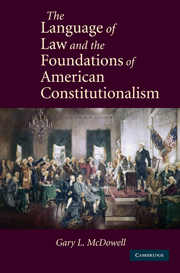Book contents
- Frontmatter
- Contents
- Preface and Acknowledgments
- The Language of Law and the Foundations of American Constitutionalism
- Introduction: The Politics of Original Intention
- 1 The Constitution and the Scholarly Tradition: Recovering the Founders' Constitution
- 2 Nature and the Language of Law: Thomas Hobbes and the Foundations of Modern Constitutionalism
- 3 Language, Law, and Liberty: John Locke and the Structures of Modern Constitutionalism
- 4 The Limits of Natural Law: Modern Constitutionalism and the Science of Interpretation
- 5 The Greatest Improvement on Political Institutions: Natural Rights, the Intentions of the People, and Written Constitutions
- 6 Chains of the Constitution: Thomas Jefferson, James Madison, and the “Political Metaphysics” of Strict Construction
- 7 The Most Sacred Rule of Interpretation: John Marshall, Originalism, and the Limits of Judicial Power
- 8 The Same Yesterday, Today, and Forever: Joseph Story and the Permanence of Constitutional Meaning
- Epilogue: The Moral Foundations of Originalism
- Index of Cases
- General Index
- References
5 - The Greatest Improvement on Political Institutions: Natural Rights, the Intentions of the People, and Written Constitutions
Published online by Cambridge University Press: 05 June 2012
- Frontmatter
- Contents
- Preface and Acknowledgments
- The Language of Law and the Foundations of American Constitutionalism
- Introduction: The Politics of Original Intention
- 1 The Constitution and the Scholarly Tradition: Recovering the Founders' Constitution
- 2 Nature and the Language of Law: Thomas Hobbes and the Foundations of Modern Constitutionalism
- 3 Language, Law, and Liberty: John Locke and the Structures of Modern Constitutionalism
- 4 The Limits of Natural Law: Modern Constitutionalism and the Science of Interpretation
- 5 The Greatest Improvement on Political Institutions: Natural Rights, the Intentions of the People, and Written Constitutions
- 6 Chains of the Constitution: Thomas Jefferson, James Madison, and the “Political Metaphysics” of Strict Construction
- 7 The Most Sacred Rule of Interpretation: John Marshall, Originalism, and the Limits of Judicial Power
- 8 The Same Yesterday, Today, and Forever: Joseph Story and the Permanence of Constitutional Meaning
- Epilogue: The Moral Foundations of Originalism
- Index of Cases
- General Index
- References
Summary
When the delegates gathered in Philadelphia in the summer of 1787 for the convention that had been called to address their common problems, they ostensibly did so in order to revise the ineffectual Articles of Confederation; their goal was to render that first national constitution capable of meeting the exigencies of the union. Rather than offer mere revisions, however, they soon found themselves embarked on the arduous task of writing a completely new fundamental law. Believing as they did that language is the essence of law and that law is the essence of liberty, they sought to craft their new constitution as carefully as possible, pulling its words and meaning from sources they believed clear and common. At the most basic level, there would be neither place nor need in such a written constitution for “metaphysical or logical subtleties.” Freedom demanded that “there be no mysteries in the governing plan”; it had to be “plain and intelligible.” Their objective was “to form a fundamental constitution, to commit it to writing, and place it among their archives where everyone would be free to appeal to its text.” They celebrated the written constitution as simply “the greatest improvement on political institutions.”
- Type
- Chapter
- Information
- Publisher: Cambridge University PressPrint publication year: 2010

